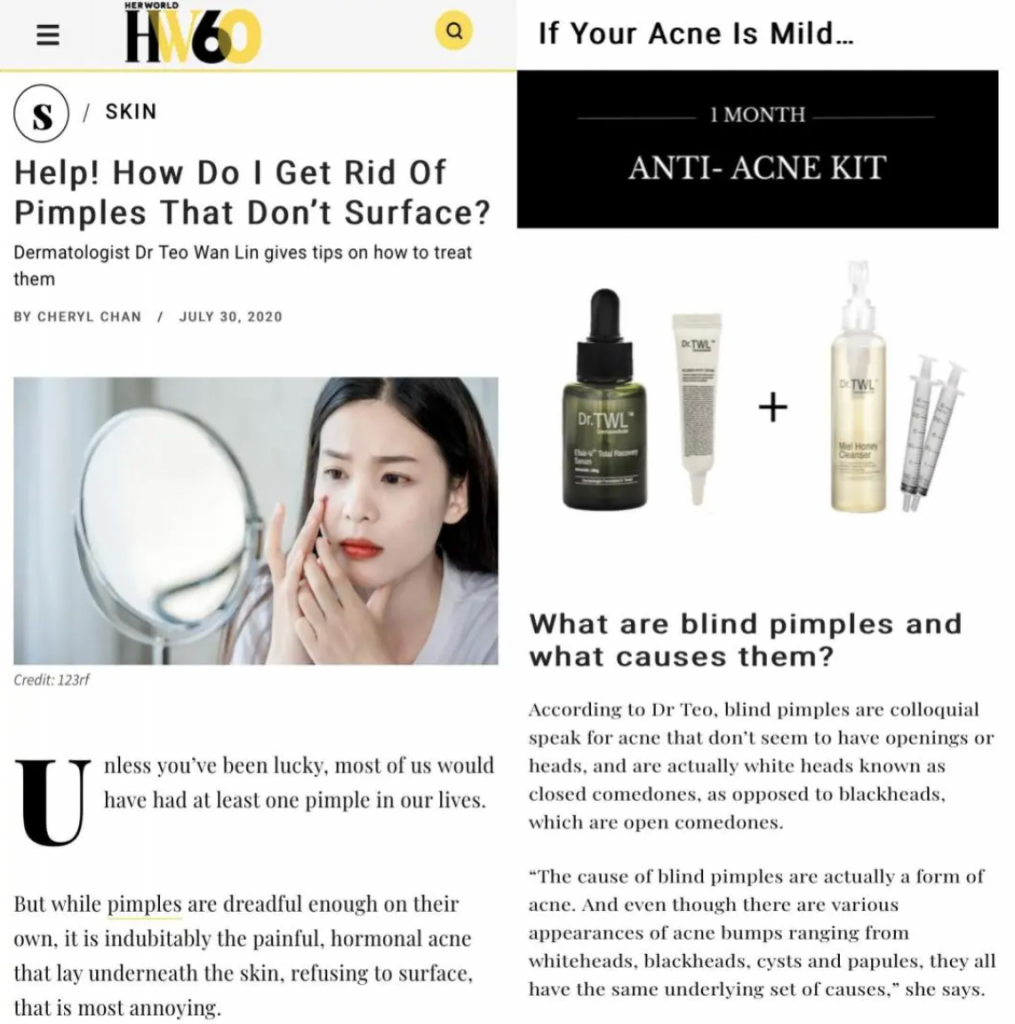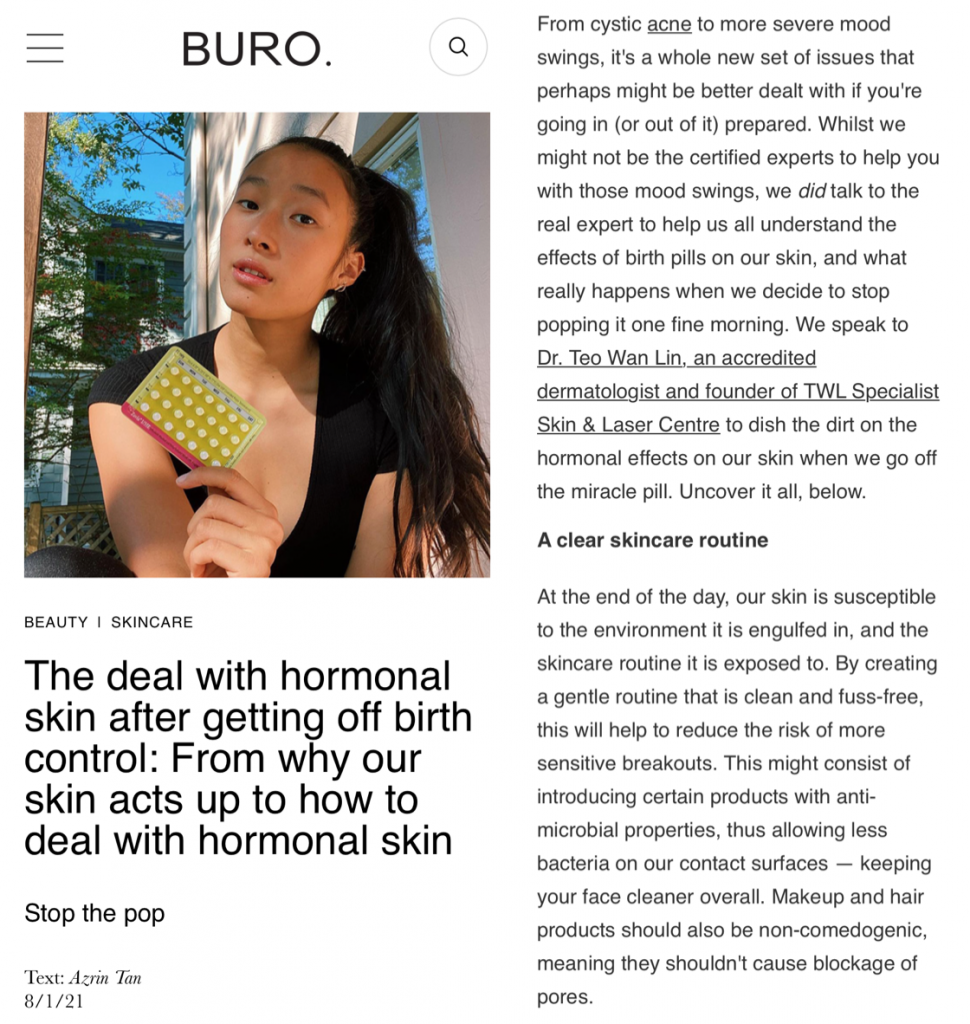DR. TEO WAN LIN
MBBS (S’PORE), MRCS (EDIN), FAMS (DERMATOLOGY)
Dr. Teo Wan Lin (Zhang Wanlin; Chinese: 张婉琳), a board-certified acne dermatologist in Singapore and director of TWL Specialist Skin & Laser Centre, specialises in medical and cosmetic dermatology. An innovator in the dermocosmetic / cosmeceutical skincare industry, she is the chief scientific officer of Dr. TWL Dermaceuticals, an e-commerce-based cosmeceutical concept, which she has taken from its inception in 2016 as a start- up to an established cosmeceutical line in Singapore/Asia today.
Why it is important to visit an accredited dermatologist for acne treatment
We know acne itself to affect not just teenagers, but also adults. Acne pathogenesis is the study of how the disease develops. It starts in a genetically susceptible individual. This means that there are certain genetic traits that increase your chance of getting acne. A quick way to screen for this is to check if any of your direct family members such as your parents or siblings have a history of acne, currently have active acne, or suffer from acne scars from active acne in their earlier adolescent years. It is also important to find out what sort of treatment they have received. Individuals who have had a history of treatment with a medication known as isotretinoin are likely to have at least moderate to severe types of acne that require strong medications to bring the condition under control.
Causes of acne from an acne dermatologist in Singapore
What are the causes of acne?
Acne is also what we consider a multifactorial disease. Besides genetics, there are several other factors at play. Inflammation is the process that drives comedone formation. Microdomedones are mini blackheads and whiteheads, which are under your skin, and gradually rise to the surface over a period of at least two to three weeks. That is when you find that the whiteheads and blackheads appear on the skin of affected individuals.
Subsequently, bacteria that lives on your skin starts to play a part. The skin microbiome is a delicate balance of good and bad bacteria that coexist for a healthy skin microbiome. It is important to know that this means if you have any disruption in the skin microbiome, you’re much more likely to have pathogenic, which is bad bacteria, infect the whiteheads and blackheads. This is when you get inflamed acne bumps, known as papules. If the inflammation is deeper, it may become a cyst. These cysts are actually filled with dead skin, pus, and other debris. If it is very long-standing, it may even become a wart cyst, which will not go away unless we conduct a surgery.
Acne dermatologist in Singapore explains different types of acne
What type of acne do I have?
We’ve spoken about the various appearances of acne papules starting from comedones, papules and also cysts. Blind pimples are the colloquial reference to whiteheads. Whiteheads are actually a form of acne. Additionally, we use the number of whiteheads and blackheads, to assess how severe the acne condition is. Anything more than five to eight pimples, at any one point of time is considered moderate acne. If the individual has cysts on their face, that would be in the category of severe acne.

Dr. Teo Wan Lin shares tips on blind pimples and how to treat them on HerWorld Magazine
Skin specialist in acne treatment
How to treat cystic acne?
Cystic acne has to be treated with oral medications, whereas comedonal acne can sometimes be treated with a combination of topical skincare. For example, an antibacterial cleanser. In our practice, we use the medical-grade honey cleanser, which has a broad spectrum, antimicrobial effect to maintain a healthy skin microbiome. In conjunction with spot acne treatments, chlorella vulgaris, is an algae extract that research shows does regulate oil production. Additionally, recent dermatology studies show that the Eastern herb Berberine, does have value in treating individuals who suffered from acne.

Dr. TWL Dermaceuticals Miel Honey Cleanser and Blemish Spot Cream featured in the Sept 2020 issue of AUGUSTMAN
Important dermatologist recommendations for acne treatment
How do dermatologists treat acne?
Oral medication for acne comprises mainly two categories. Dermatologists usually start with oral antibiotic treatment because it is generally very tolerable and works for the majority of individuals who suffer from physiologic acne. However, adult acne may be a lot more recalcitrant, but it is also possible to treat with oral antibiotics. An option for adult women who find that their acne flares up with their menstrual cycles is the administration of an oral contraceptive pill. These are commonly known by their trade names, Diane 35 and Estelle 35. These estrogen-based contraceptive pills also contain an additional active ingredient that blocks the action of the male hormone testosterone which is responsible for the premenstrual breakout of acne.

Dr. Teo, acne dermatologist in Singapore, shares on hormonal acne and different types of treatment such as oral contraceptives with Buro Singapore
The way dermatologists approach the treatment of acne is also in terms of the patient’s preference. There are non-oral methods, which are effective as well. Blue light therapy is commonly administered for pregnant or lactating women and in younger adolescents whose parents may not be as comfortable for them to take oral medications. Blue light therapy is best administered two times a week, half an hour in duration for each session for a total of eight sessions or for four hours.
Do acne dermatologists in Singapore prescribe Accutane?
Finally, the other category of oral medication would be isotretinoin, or Accutane and other brand names. Isotretinoin is a vitamin A derivative drug that is extremely effective in the treatment of cystic acne. It is also a suitable treatment for moderate, persistent acne. This refers to patients who have had moderate acne symptoms that did not respond to first-line topical or oral antibiotic treatment. Your acne dermatologist can prescribe Isotretinoin, which is a prescription-only medication. It is very important for individuals to understand that the treatment of acne targets at returning the skin to a blemish-free state. However, when one stops oral medications, topical creams are very important and essential in the maintenance of skin.
Treating teenagers with acne
For physiologic acne, at least, under the age of 18 years old, and for adult acne, it may be necessary for the individual throughout their adult life to continue a topical treatment. This is because of the underlying upregulation in sebum activity in individuals who suffer from acne. The sebaceous glands are the oil glands responsible for producing oil, or sebum. Sebum is a natural moisturizer that protects your skin. It also helps to maintain a healthy skin microenvironment. However, in acne-prone individuals, their genetics actually predispose to seborrhea. This means that even after we treat the acne in these individuals, their genetic tendency to overproduce oil, and also to have inflammation, drives the formation of whiteheads and blackheads, which subsequently can turn into acne.
Acne dermatologist in Singapore shares on maskne

Dr. Teo Wan Lin is especially known as a maskne and acne expert, and was invited to answer the most common questions about skincare for acne and maskne in the Clozette x Mentholatum Acnes IG live.
With the advent of mask wearing, maskne is now a prevalent form of acne that can occur in individuals without pre-existing acne, but can also cause flare ups in acne-prone individuals. A word on maskne – it is really related to the process of occlusion, where the mask itself, be it the disposable mask, N-95 surgical or cloth mask, create an occlusive environment where the individual is breathing in and out of an enclosed space. This can cause an imbalance in bacterial load. This drives bacterial dysbiosis and triggers off acne flare ups. For maskne treatment, it’s important to understand that the type of mask that you wear is very relevant.
With the advent of the Delta Variant which is far more contagious. Health authorities have suggested wearing the N-95 mask, which is medical grade personal protective equipment, and that is actually one of the largest culprits of maskne. Healthcare workers who suffer from maskne occlusion type acne, have predominantly been affected by the wearing of the N-95 mask.
Can dermatologists help with maskne?
Dr.Teo Wan Lin, our dermatologist, proposed in her paper “Design elements in face masks can provide an effective fit to prevent droplet spread” that the biofunctional textiles, which are usable in an equivalent manner to surgical masks, can line or cover the mouth area under the N95 mask. This is a way of delivering topical antibiotic-like effect without the use of topical antibiotics. This is to prevent and also treat occlusion acne or maskne.
If you suspect that you have acne. You may book an appointment to see Dr. Teo Wan Lin, acne dermatologist in Singapore, at TWL Specialist Skin & Laser Centre. Acne patients can be reviewed by teledermatology with medications delivered to your doorstep within the same day.
